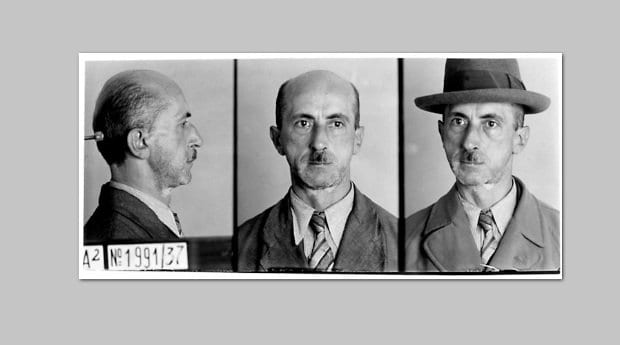As a young merchant-in-training in Hamburg, Friedrich-Paul Von Groszheim could meet other gay men in bars, celebrate openly, read gay magazines and look forward to what seemed the inevitable repeal of anti-gay laws.
Things were getting better.
“The so-called ‘Golden ’20s’ were for me a wonderful time,” he later remembered. “I failed to recognize the problems of the time — unemployment, the growing poverty, the political radicalization. But I was so wonderfully young.”
Then it all collapsed. In January 1937, Von Groszheim was rounded up by the SS, beaten and imprisoned for 10 months. Less than a year later, he was imprisoned again, tortured and finally castrated by the Gestapo as a condition of his release.
Von Groszheim’s story reemerges in the travelling exhibit Nazi Persecution of Homosexuals, 1933–1945, on loan from the United States Holocaust Memorial Museum in Washington, DC. The exhibition is now on display at the Vancouver Holocaust Education Centre until Dec 4, with a guided tour at 1pm on Nov 17.
The exhibit’s most striking narrative is not how gay people died during the Holocaust, but how they lived before it.
By the early 1930s, more than a quarter of a million gay men and lesbians lived in Berlin — nearly one in 10 citizens. Gay men had their own bars, clubs and newspapers, and women dined in public with coat tails and cigars. Male homosexuality was still officially illegal under section 175 of the German criminal code, but the prominent sexologist Dr Magnus Hirschfeld was campaigning, with some success, for its repeal. Even Hitler’s personal friend and commander Ernst Röhm was openly gay and brought other gay men with him into the ranks of the party.
The persecution of gay people during the Holocaust was all the more terrifying for its precipitousness. The story is disturbing in much the same way as recent developments in Russia: it proves that gay acceptance can disappear as easily as it is won.
The curators of the Vancouver Holocaust Education Centre (VHEC) took that message seriously and paired the American exhibit with its own on the Nazi-run 1936 Olympic Games in Berlin. While VHEC education director Adara Goldberg warns against comparing any country directly to Nazi Germany, she says the juxtaposition was absolutely intentional.
“As much as we aren’t a political organization, there are some things that need to come to light,” she says. “All the time we are battling against the words, ‘Never again.’”
The impetus to bring the exhibit to Canadian students, in fact, began after directors at human rights group Egale Canada read research from the 2011 “Every Class in Every School” study on classroom homophobia. A few Canadian students, in one anecdote, cheered in support when a video mentioned that the Holocaust affected gay people.
“We have an illusion in Canada that we’re on a road to progress that only goes one way,” says Egale Canada Human Rights Trust director Mark Riczu, who helped to bring the exhibit to Canada. “Nazi Germany, coming out of the Weimar Republic, shows us what can happen.”
Comparing current events to Nazi Germany is now unbearably cliché, but sometimes — backed by serious historical scholarship — there are genuine lessons to be found. Von Groszheim, living his sunny early years in Hamburg, might hardly have believed what would become of Germany’s gay community.
“I’m living proof that Hitler didn’t win,” he said, 50 years after his imprisonment. “If I don’t tell my story, who will know the truth?”
Nazi Persecution of Homosexuals, 1933–1945
Runs until Wed, Dec 4
Guided tour on Sun, Nov 17 at 1pm
Vancouver Holocaust Education Centre
50–950 West 41st Ave
vhec.org


 Why you can trust Xtra
Why you can trust Xtra


